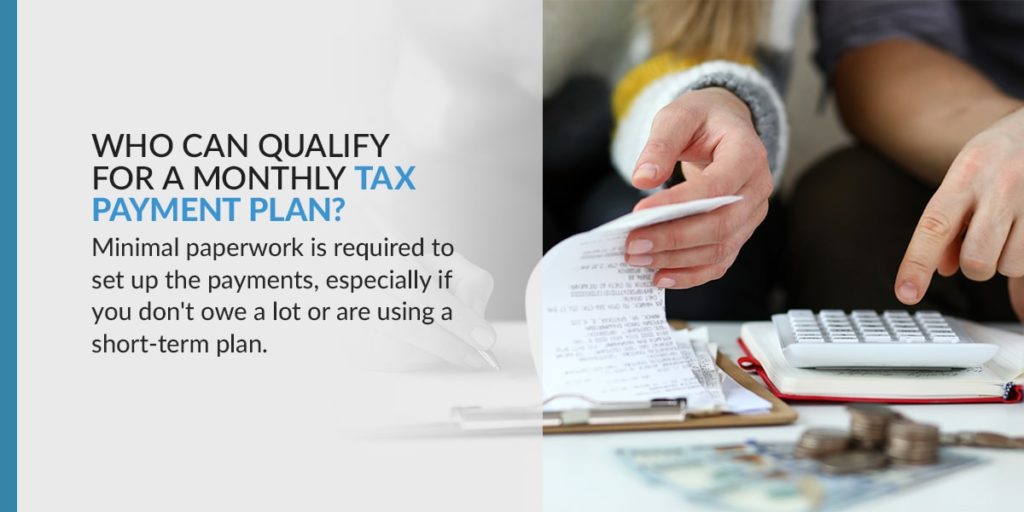
100+ Years of Combined Tax Resolution Experience.
100+ Years of Combined Tax Resolution Experience.
For some taxpayers, tax time means they get a sizable refund, and others find out they owe the Internal Revenue Service (IRS) a hefty sum. If your tax bill is more than you can afford to pay at once, you have options. The IRS offers tax payment plans, also known as installment agreements, that let you break up your tax bill into more manageable payments.
Learn more about the benefits and drawbacks of a monthly payment plan and what you need to do to sign up for one. Working with a tax attorney can help you set up a plan that pays off your taxes quickly and helps minimize interest and penalties.
Table of Contents
What Is a Monthly Tax Payment Plan?
A massive tax bill can be overwhelming, especially if you weren’t expecting it. The IRS understands that sometimes people can’t pay the taxes they owe in one payment. That’s why they have several different payment plans, or installment agreements, available to taxpayers to help them pay off their tax balances. The type of payment plan you ultimately settle on depends on how much you owe and how long you need to pay it.
With a short-term payment plan, you agree to pay off your tax balance within 120 days. If you need more than 120 days to pay your balance, you’ll need to sign up for a long-term payment plan. Usually, you can take up to six years to pay with a long-term payment plan.
Depending on how much you owe the IRS, you might have to request approval for your payment plan. If you owe more than $100,000 and want to pay on a short-term plan, the IRS will need to review your request. A tax attorney can help you submit the necessary paperwork to get your application for a short-term payment approved. For a long-term plan, you’ll need approval if your tax balance is more than $50,000.
Who Can Qualify for a Monthly Tax Payment Plan?
It is very easy to qualify for a full payment installment agreement. Minimal paperwork is required to set up the payments, especially if you don’t owe a lot or are using a short-term plan. You will need to make sure that you don’t have any missing tax returns. You must have all required tax returns filed to be considered for any type of IRS payment plan or resolution.
With a payment agreement, you can avoid having the IRS take collection action against you. You won’t have to worry about having your bank levied, your wages garnished or having a lien placed on your home, as long as you make your payments. If you miss a payment and end up defaulting the payment plan, the IRS can take collection action against you. So it is important that you don’t miss any payments and that file all your future tax returns on time and pay whatever taxes you may owe.
Pros and Cons of a Monthly Payment Plan
Signing up for a monthly payment plan means the IRS can’t garnish your wages or take other collection actions against you — as long as you stay current on the plan. Paying your tax bill in installments can ease financial stress.
There can be downsides to a monthly payment plan, though. If you can’t pay the full amount you owe by the tax deadline, you will have to pay interest on the balance and penalties. A tax bill accrues interest from the day it becomes overdue until you pay the balance in full.
Another drawback of an installment agreement is that you may have a high monthly payment. While the IRS may work with you on an affordable monthly payment, they will use strict standards when determining what you can afford. So there is a chance your payment could be higher than you would like. You also aren’t likely to save money through this agreement. With an installment agreement, you are agreeing to pay the full amount of taxes you owe. If you’re concerned about a high monthly payment, talk to a tax attorney to get a better understanding of what all of your options are.
Polston Tax Can Help You Create a Monthly Tax Payment Plan
A high tax bill can be a source of stress. Fortunately, the IRS is happy to work with taxpayers to set up a payment plan. The sooner you contact the IRS about a monthly plan, the sooner your bill will get paid and the less you’ll owe in interest.
Polston Tax can help you explore your payment options and work with the IRS. We know all the available options for taxpayers and know what it will take for you to qualify. Call us at 844-841-9857 or contact us online to schedule your free consultation.
Learn More About Advanced Tax Planning
Additional Readings

In the US, the Internal Revenue Service, or IRS as it is commonly known, handles the responsibility of collecting federal taxes and ensuring that tax laws are followed. Many people think of the organization only when it is tax season and don’t understand what else the IRS is in charge of. The IRS Data Book...

In March 2020, the Internal Revenue Service (IRS) paused tax collections and enforcement policies temporarily in response to the coronavirus pandemic. Rising unemployment rates had left millions of taxpayers struggling to pay their bills. However, with the country’s health climate back on the rise, the IRS announced that their automated lien and levy programs would...

The school year is well underway, and while summer is over- there are certain summer activities which can affect your financial situation. Many people use the summer to get married, go on vacation, send kids to camp and work part-time at a seasonal job. While your summer may be filled with sunshine and fun, different activities or...

For some taxpayers, tax time means they get a sizable refund, and others find out they owe the Internal Revenue Service (IRS) a hefty sum. If your tax bill is more than you can afford to pay at once, you have options. The IRS offers tax payment plans, also known as installment agreements, that let...

Many people have questions about why their filing status matters. Some of the most misunderstood filing statuses are Married Filing Jointly (MFJ) and Married Filing Separately (MFS). MFJ is a filing status for couples who have wed before the tax year’s end. MFJ allows you and your spouse to record your incomes, credits, exemptions and deductions on the same return. The alternative is...

Did you know that last year, the IRS rejected about 3.4 million tax returns that were filed electronically? In many of those cases, the return wasn’t rejected because of fraud or some major problem. The issue was simply that the filer had entered the wrong AGI for the previous year’s income tax return. An incorrect...


